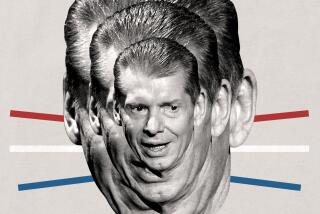THQ Among Valley’s Top Gainers
- Share via
CALABASAS — TH who?
THQ Inc. may hardly be a household name, but don’t tell that to investors. Stock for the video game designer soared 50% in the third quarter to a Sept. 30 close of $43.13, making THQ one of the Valley’s biggest gainers on Wall Street for the three-month period.
It closed Monday at $40.75.
In many ways, THQ proved during the quarter that it is no longer a bit player dependent on just one or two titles for its success. Investors, encouraged by some rosy predictions from analysts, took the message to heart in the third quarter and bid up the company’s stock price to its highest levels in five years.
The litmus test that had all eyes glued on THQ involved a licensing agreement with World Championship Wrestling, said Tony Gikas, an analyst at U.S. Bancorp Piper Jaffray. World Championship Wrestling games had been a THQ mainstay for the last few years, but the two sides ended their agreement in the second quarter. THQ signed another agreement with the World Wrestling Federation effective in the fourth quarter, meaning the company went from July to September without any wrestling-related revenues.
Despite the lack of those titles, however, Gikas has predicted that THQ will post year-over-year revenue growth of 71% and earnings growth of 32% when it releases its third-quarter figures Oct. 26. Robert De Lean, an analyst at Morgan Keegan & Co., predicted an even larger 93% growth in third-quarter revenues.
De Lean points out that THQ has grown beyond its franchise of wrestling games, adding popular new products including a motorcycle racing game and RugRats titles.
“Last year this was a one-product line company,” De Lean said. “This year it’s not. All of a sudden they’ve built a diversified portfolio of brands, and so therefore revenues come from many different sources. That reduces a big portion of the risk. The label as a one-product-line company no longer applies.”
Indeed, encouraging words like De Lean’s were popping up everywhere on investors’ video screens during the quarter. In one of the company’s biggest boosts, analyst Stewart Halpern left ING Barings in August and took up residence at Bank of America Securities, giving THQ much wider exposure to a broad range of heavyweight investors. BofA then issued a “strong buy” on the stock, and set a target price of $60 per share by year’s end.
Gikas of Piper Jaffray also provided a boost last month when he raised his third-quarter estimates to 31 cents a share from 29 cents, raised his estimates for next year to $2.90 from $2.80 per share and said prospects look outstanding for the December quarter and very positive for 2000. Upping the score even more, THQ was ranked third on Fortune magazine’s annual list of America’s 100 Fastest Growing Companies, and was added to the Russell 2000 Index in July.
“There was a lot of ‘show me’ in our stock, and we showed them,” said THQ Chief Executive Officer Brian Farrell. “You say you are going to thrive and survive without wrestling, and when we release our numbers, we’re comfortable with the numbers that are out there.”
THQ knew and announced as early as June 1998 that it would lose the World Championship Wrestling license, and spent much of the last year planning its transition accordingly, Farrell said. In fact, it was a reliance on a single game platform--Nintendo Super NES--that nearly put the company out of business five years ago when it failed to anticipate a glut of titles for the system and the rise in popularity of Sega Genesis.
Next year, THQ will get about 14% of its revenues from PC software, 40% from Sony PlayStation titles, 30% from the Nintendo 64, 14% from Game Boy and 5% from the newly released Sega Dreamcast, according to Gikas’ estimates. By comparison, the company depended on Nintendo’s 64 titles for a lopsided 59% of its revenues in 1998, he estimated.
The number of titles has also grown from 21 in 1998 to an estimated 35 this year and 44 next year, according to Gikas. The company designs its games in San Jose and Boston, but maintains its headquarters and a game-testing facility in Calabasas where about half of its 250 employees are based.
Reflecting its recent diversification, three of THQ’s most popular titles in the third quarter were “Championship Motocross Featuring Ricky Carmichael” for the PlayStation; “RugRats: Scavenger Hunt” for Nintendo 64; and “RugRats: The Movie” for Game Boy, Farrell said.
“I think there’s a theme here that the breadth to THQ’s product line is very strong, and we’ve had an ability to make quality products, ship them on time and meet the expectations of the street,” he said. “We diversified completely. We’re completely platform independent. We don’t have an interest if Sony wins or Nintendo wins or if Sega wins. We’re in the game content business.”
While THQ posted revenue growth of more than 50% in the first and second quarters of 1999, Farrell and most analysts acknowledged that the recent gains have come at other companies’ expense and will probably slow as THQ solidifies its position in the market.
“I don’t think they’ll be able to continue to double the business every year,” De Lean said. “At some point, earnings and revenue growth will slow somewhat. But it’s still going to be strong. I think they can still increase revenues at 25% to 30% annually over the next few years.”
More to Read
Inside the business of entertainment
The Wide Shot brings you news, analysis and insights on everything from streaming wars to production — and what it all means for the future.
You may occasionally receive promotional content from the Los Angeles Times.










